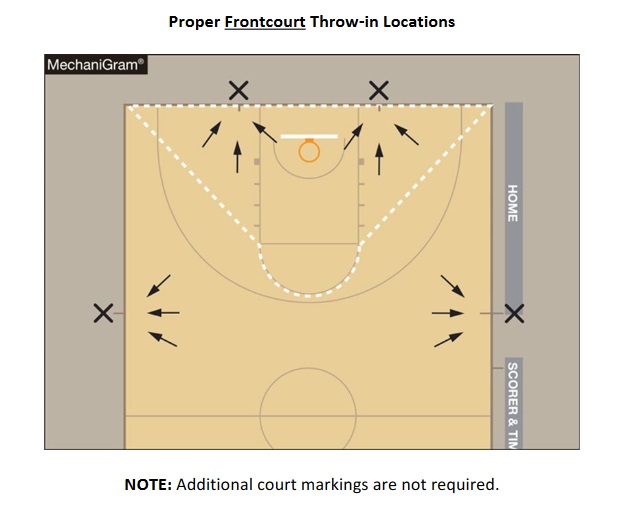A summary of the rule changes for the upcoming 2023-2024 basketball season:
2-1-3 (NEW): Requires the shot clock operator to sit at the scorer's table and timer's table, if using a shot clock.
Rationale: Establishes the placement of the shot clock operator for those states utilizing the shot clock and the growing use of video boards that allow tablet control from anywhere in the gym.
==================================
3-4-5: Requires uniform bottoms on teammates to be like-colored while allowing different styles of uniform bottoms among teammates.
Rationale: Clarifies that teammates must all wear like-colored uniform bottoms but may wear multiple styles while aligning language with other NFHS rules codes.
==================================
3-5-6: Allows undershirts worn under visiting team jerseys to be black or a single solid color similar to the torso of the jersey. All teammates wearing undershirts must wear the same solid color.
Rationale: Allows schools with hard-to-find colors to wear black under visiting team jerseys while continuing to require all team members to match.
==================================
4-8-1: Eliminates the one-and-one for common fouls beginning with the seventh team foul in the half and establishes the bonus as two free throws awarded for a common foul beginning with the team's fifth foul in each quarter and resets the team fouls at the end of each quarter.
Rationale: Improves flow by providing an opportunity for teams to adjust their play by not carrying over fouls from quarters 1 and 3 to quarters 2 and 4 while significantly reducing the opportunity for correctable errors to occur. Minimizes the risk of injury by eliminating the one-and-one and reducing opportunities for rough play during rebounding opportunities.
==================================
7-5-2 thru 4: Establishes four throw-in spots (the nearest 28-foot mark along each sideline or the nearest spot 3-feet outside the lane line on the end line) when a team gains or retains possession in their frontcourt after the opponent commits a violation, a common foul prior to the bonus, or the ball becomes dead (i.e. inadvertent whistle or held ball).
Rationale: Simplifies the throw-in procedure when a team gains or retains possession for situations other than an out-of-bounds throw-in.
==================================
7-6-6: Allows the official administering a throw-in to the wrong team to correct the mistake before the first dead ball after the ball becomes live unless there is a change of possession.
Rationale: Allows for a correction of an official's mistake in a more reasonable timeframe.
==================================
9-3-3: Establishes that a player may step out of bounds without penalty unless they are the first player to touch the ball after returning to the court or if they left the court to avoid a violation.
Rationale: Allows a player to step out of bounds if they gain no advantage and penalizes a team only if they gain an advantage by leaving the court and returning to avoid a violation or to be the first to touch the ball.
2-1-3 (NEW): Requires the shot clock operator to sit at the scorer's table and timer's table, if using a shot clock.
Rationale: Establishes the placement of the shot clock operator for those states utilizing the shot clock and the growing use of video boards that allow tablet control from anywhere in the gym.
==================================
3-4-5: Requires uniform bottoms on teammates to be like-colored while allowing different styles of uniform bottoms among teammates.
Rationale: Clarifies that teammates must all wear like-colored uniform bottoms but may wear multiple styles while aligning language with other NFHS rules codes.
==================================
3-5-6: Allows undershirts worn under visiting team jerseys to be black or a single solid color similar to the torso of the jersey. All teammates wearing undershirts must wear the same solid color.
Rationale: Allows schools with hard-to-find colors to wear black under visiting team jerseys while continuing to require all team members to match.
==================================
4-8-1: Eliminates the one-and-one for common fouls beginning with the seventh team foul in the half and establishes the bonus as two free throws awarded for a common foul beginning with the team's fifth foul in each quarter and resets the team fouls at the end of each quarter.
Rationale: Improves flow by providing an opportunity for teams to adjust their play by not carrying over fouls from quarters 1 and 3 to quarters 2 and 4 while significantly reducing the opportunity for correctable errors to occur. Minimizes the risk of injury by eliminating the one-and-one and reducing opportunities for rough play during rebounding opportunities.
==================================
7-5-2 thru 4: Establishes four throw-in spots (the nearest 28-foot mark along each sideline or the nearest spot 3-feet outside the lane line on the end line) when a team gains or retains possession in their frontcourt after the opponent commits a violation, a common foul prior to the bonus, or the ball becomes dead (i.e. inadvertent whistle or held ball).
Rationale: Simplifies the throw-in procedure when a team gains or retains possession for situations other than an out-of-bounds throw-in.
==================================
7-6-6: Allows the official administering a throw-in to the wrong team to correct the mistake before the first dead ball after the ball becomes live unless there is a change of possession.
Rationale: Allows for a correction of an official's mistake in a more reasonable timeframe.
==================================
9-3-3: Establishes that a player may step out of bounds without penalty unless they are the first player to touch the ball after returning to the court or if they left the court to avoid a violation.
Rationale: Allows a player to step out of bounds if they gain no advantage and penalizes a team only if they gain an advantage by leaving the court and returning to avoid a violation or to be the first to touch the ball.
